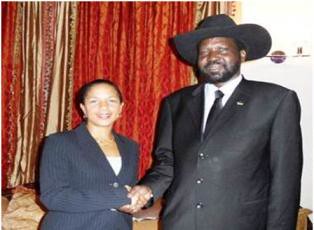
South Sudan President Salva Kiir with Susan Rice, the United States Ambassador to the United Nations. The state of Sudan was partitioned after the South held a referendum on its future in January 2011., a photo by Pan-African News Wire File Photos on Flickr.
South Sudan Urged to Stop Use of Death Penalty
By CHARLTON DOKI
JUBA, South Sudan
abcnews.go.com
On death row in South Sudan: Convict hopes for a moratorium on executions
The Associated Press
South Sudan was one of 111 countries to vote in favor of a United Nations resolution last year calling for a moratorium on the death penalty, but that's of little comfort to Abdallah Boaz.
Boaz, a 35-year-old Ugandan, is one of more than 200 prisoners on death row in the world's newest country. He was convicted of murder in January 2012, shortly after a corpse was found outside his home.
"Here in South Sudan if you are foreigner you are guilty of anything. I don't know Arabic and I couldn't understand most of what my accuser was saying for all the six times I appeared in court," Boaz said in a death row interview with The Associated Press.
"The judge told me that I was the killer and sentenced me to death," said Boaz, who lamented that he couldn't afford a lawyer to appeal the sentence and now is "praying that a miracle will happen, someone will come to my rescue and I will not be executed."
The human rights group Amnesty International on Wednesday urged South Sudan to implement a moratorium on the death penalty in an annual report that found that a global trend toward ending the death penalty continued last year.
Most countries in Africa have stopped carrying out death sentences. South Sudan, Sudan, Somalia, Gambia and Botswana were the only African countries to carry out executions last year.
South Sudan became the world's newest country in 2011, when it peacefully broke away from Sudan. It has carried out 12 executions in that time, Amnesty said, including five last year.
"More than 200 prisoners were on death row, shackled and crowded into cramped and dirty cells," the report said.
In December South Sudan was among 111 member states that voted in favor of a U.N. General Assembly resolution calling for a moratorium on the death penalty.
"Therefore we are calling on the government of South Sudan to heed their own call at the United Nations and implement it at home and suspend all further executions and review the use of the death penalty with possible abolition in future," said Jan Erik Wetzel, an adviser on the death penalty to Amnesty, who spoke over the phone from London.
Executions in South Sudan are reviewed by the Supreme Court and approved by the president as required by law. But Amnesty expressed concern that the country's nascent judicial system could not guarantee a fair trial.
"Quite often people were unable to follow the court proceedings and potentially they did not speak the language that the court officials were using. Quite often the defendants didn't have access to lawyers," Wetzel said.
Last September South Sudan's permanent representative in Geneva, Riek Puok Riek, told the U.N. Human Rights Council that "South Sudan agrees with ... the logic of abolishing the death penalty. But we believe that this is a process that could be approached gradually," according to the report.
Twenty-one countries were recorded as having carried out executions in 2012, the same number as in 2011, but down from 28 countries in 2003, Amnesty said. South Sudan's northern neighbor, Sudan, executed 19 people in 2012, more than any other African country, Amnesty said.
Amnesty counted 682 confirmed executions in 21 countries in 2012 — two more than in 2011. The top five countries in terms of numbers of executions last year were China, Iran, Iraq, Saudi Arabia and the United States.
That 682 figure does not include the number of executions in China, which executes more people than any other country but keeps the data secret. The U.S. executed 43 people in 2012, the same figure as the previous year. A total of 77 new death sentences were imposed, the second lowest since the Supreme Court revised capital punishment laws in 1976, Amnesty said.
No comments:
Post a Comment